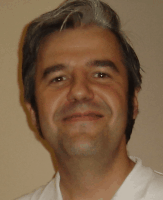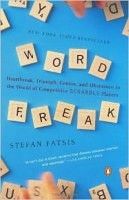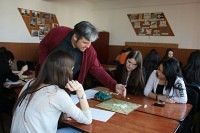Name: Catalin-Eugen Caba
Age: 40 years old
Country: Iaşi, Romania
Education: Gh. Asachi Technical University of Iaşi, Faculty of Electrical Engineering
Employment: Head of the Department in Smart SA
Scrabble Club: Preventis Iaşi
Next in our Scrabble interview series is Romanian player Catalin-Eugen Caba. The director of the A.C.S. PREVENTIS in Iaşi is very committed to working with junior players. His primary concern is to teach pupils in English Scrabble and to prepare them for competitive tournaments. In part 2 of the interview, he also discussed with us the past and present Scrabble situation in his home country Romania.
From Anagrams to Scrabble
Caba found his way to Scrabble through other puzzles like rebuses (picture puzzles) and anagrams. Word games have interested him since he was a teen, so it wasn’t a big stretch to start doing Scrabble. At 14 years of age, Caba started playing competitively. Now 40 years old, he had his premiere in 1988 when attending a Scrabble contest at the Informatics College in Iaşi. In the contest “they proposed a thematic duplicate game to us based on words from our domain – I remember COMPUTER, OPERATOR, PROGRAM and so on.” Caba won it and became more and more confident in playing. At the age of 16, he won his first B-division competition in the National Romanian Championships and his Scrabble career took off from there.
Experience in International Scrabble Tournaments
From the 1990s to the new millennium, Catalin Caba gained a great deal of experience in competitive play by visiting a lot of European Scrabble tournaments. He played Scrabble contests in Romanian as well as the English language, which is not always easy to separate in your mind:
In 2008 Caba “decided to remain on our national Scrabble scene as a referee”, after winning twice at the National Club Championships and once at the National Cup with his team University Cluj. Some of his English Scrabble highlights were the Malta Open in 2009 (1st C-rating) and 2010, as well as the Israeli and German Open in 2013.
Caba couldn’t attend as many international contests as he wanted. But in 1999 he had the chance to take part in the World Scrabble Championships, incidentally making contact with a famous Scrabble author:

Visiting Scrabble tournaments abroad is also an opportunity for the Romanian player to travel and get to know other countries: “That’s how I discovered the beauty of Malta, the holy places of Jerusalem, Bethlehem, or Nazareth, the old castles in the Heilbronn area, Melbourne, and the wonderful place at the end of the world where I could grow old.” Something else that Caba enjoys at international contests is the “etiquette that governs the English Scrabble tournaments” like “the self adjudication of the words, the fair play and courtesy” or simply “the coffee breaks”.
From Tournaments to Local Scrabble Work in Iaşi
Catalin Caba explained to us that Scrabble was introduced in Romania in 1983, a period when the country was living under Communism when the “TV programing ran 2-3 hours a day, nothing to read in the newspapers, so people were hungry to find new things to stimulate their minds.” So it was no surprise that Scrabble became famous in the country. Four clubs were even founded in the region of Iaşi. Caba joined one of them in 1989. Then in 2000, when political conditions had changed, a reorganization of the Scrabble clubs followed:
This also meant a change for Caba’s play, he went from the Horizon club to Argus until 2006, and then played for University Cluj, “the third most important sport club in Romania and the best in Scrabble competitions” as he states. Besides playing tournaments, Caba also discovered his passion for teaching Scrabble and began his local Scrabble work:
The Junior Scrabble Projects in Romania
As mentioned above, Catalin Caba is very active in teaching junior players in Scrabble. He is also personally involved through his son Cristian, who became a Scrabble enthusiast at a young age too. A proud Scrabble father can tell:
 The fact that his son got captured by enthusiasm for the word game just like he had encouraged Caba to get more involved in training young players. Nevertheless, it’s not all that easy to raise an interest for Scrabble activities outside the usual school program, “but once they have been infected with the ‘Words Microbe’, Scrabble gains future champions.” He came to teach English Scrabble at the Miron Costin High School, where a multilingual school Scrabble contest was held in 2013. The scholar project is organized by the English teachers of the school. Caba works pro bono at the scholar project, spending two hours per week.
The fact that his son got captured by enthusiasm for the word game just like he had encouraged Caba to get more involved in training young players. Nevertheless, it’s not all that easy to raise an interest for Scrabble activities outside the usual school program, “but once they have been infected with the ‘Words Microbe’, Scrabble gains future champions.” He came to teach English Scrabble at the Miron Costin High School, where a multilingual school Scrabble contest was held in 2013. The scholar project is organized by the English teachers of the school. Caba works pro bono at the scholar project, spending two hours per week.
This scholar project became rather big and soon attracted more organizers and junior players:
Being keen on this event, Caba decided to continue teaching English Scrabble and even more schools were infected with the idea. Many of the junior players got hooked and have started to visit tournaments.
This subject, which is so important to Caba, is constantly growing. A second youth competition was organized for Eurolexis where more than 100 young players took part, adding a sixth language to the multilingual tournament. “For the first time in Romania, a complete game of German Scrabble was played,” Caba emphasizes. Special thanks for that goes to Ben Berger and the German Scrabble Association, who sent him “original games, tiles and lists, which will help our kids to continue studying and playing German Scrabble.”
The second part of the interview will be published on October 1st.


Congratulations Catalin ! You are doing a great job by teaching the young kids.
Soon you will see the results.